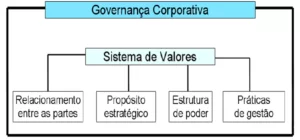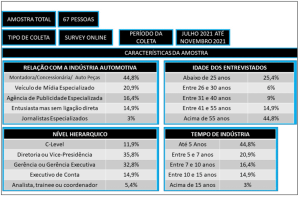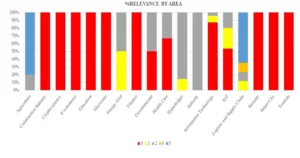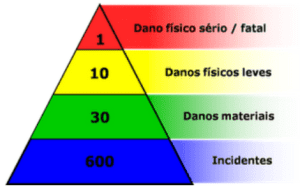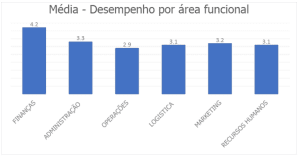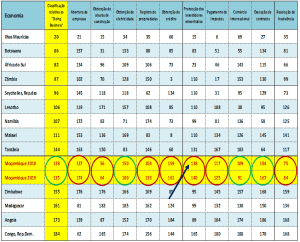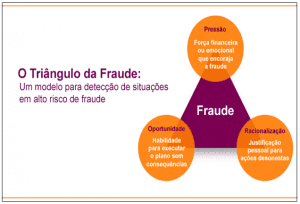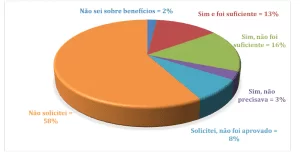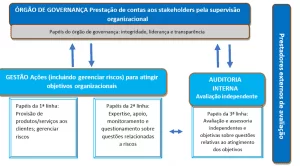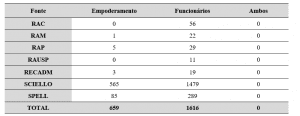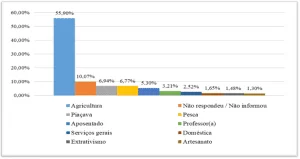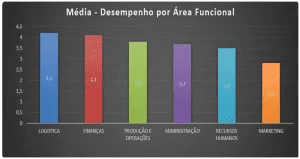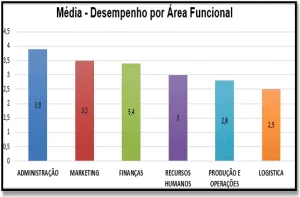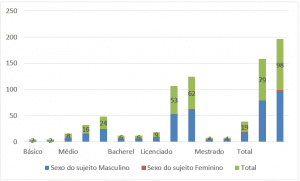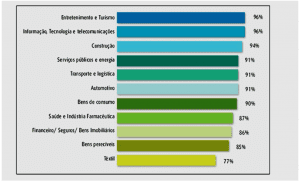ORIGINAL ARTICLE
ANTUNES, Juliana Borges Martins [1]
ANTUNES, Juliana Borges Martins. Global trade as a growth agent for the world economy. Revista Científica Multidisciplinar Núcleo do Conhecimento. Year. 07, Ed. 08, Vol. 05, pp. 47-53. August 2022. ISSN: 2448-0959, Access link: https://www.nucleodoconhecimento.com.br/business-administration/global-trade
ABSTRACT
This study cites the main theories that support and underlie global trade, increased by the process of economic integration and its importance for global trade, as well as international economic development from global trade and the challenges faced and opportunities of the main interconnected markets. Based on these theories and the constant need for companies to remain sustainable in an increasingly globalized and, consequently, competitive market, this study seeks to answer the following problem situation: how does world economic growth occur based on global trade? The guiding objective is to theoretically analyze global growth as an agent of world growth. To respond to this objective, a brief approach is presented to the main theories that confirm and support global trade and discusses the integration, development, challenges and opportunities of global trade. Therefore, this research was developed based on a bibliographic study, with the collection of bibliographic material on the subject in e-books, scientific articles and website according to the theme in question. It was found that integration into the world economy is an influential means for the rise of economic growth, conceiving development and consequently reducing the poverty of a nation. In a growth process, in addition to technological factors, there are other difficulties and it can be said that the lack of investment in human capital, respect and care for the environment are a complex challenge. Thus, the results allow us to conclude that the growth of global trade is, in turn, the result of both technological developments and joint efforts in search of a better quality of life for a target group, an economy, a nation.
Keywords: Global trade, Integration, Competitiveness, Growth, Technology.
1. INTRODUCTION
The last few decades have witnessed the rapid growth of world trade. In view of this, the specialization of countries is promoted by international trade, as countries manage to advance, in the first place, taking advantage of their resources, concentrating their efforts on what they can produce the best. Then, having satisfied the local market for these products, they sell them to other countries, exchanging them for products that other countries work better with greater efficiency.
For the authors Segovia, Espinosa and Flores (2019, p. 51), “international trade is based on different theories, which from different conceptions, try to explain the functioning of economies and with them the commercial movements of goods”.
In order to understand the relevance of global trade to the world economy, a brief approach to the main theories that confirm and support global trade is necessary.
Classical theories of international trade began in the late 18th century in reaction to mercantilism. There are several authors and literature regarding international trade, and the main classical theories considered in this study are proposed by Smith and Ricardo. According to Cruz (2018), some important theories:
- Mercantilist: the higher the level of exports, the greater the power and wealth of a nation (accumulation of metals: gold and silver, currency of the time);
- Absolute advantage: proposed by Adam Smith (late 18th century), against high taxation and state restrictions. The concept advocates production with greater efficiency and quality;
- Comparative advantage: by David Ricardo (in 1817), as an option to the absolute theory, he considered relative and not absolute costs, stating that if an economy does not have an absolute advantage in the production of some good, it should also market the products to other economies with greater comparative advantage;
- Factor ratio: proposed by Heckscher and Ohlin (early 1900s), it shows that each nation will be productively more efficient in products that have abundant raw materials. Thus defending that an economy should export these products and import those that use scarce productive factors in the country;
- Product life cycle: Raymond Vernon, in 1966, considers that the export and import particularities of a given product may vary during the commercialization stage.
At the end of the 20th century, many renowned economists emerged who proposed new thinking on international trade.
Based on these theories and the constant need for companies to remain sustainable in an increasingly globalized and, consequently, competitive market, this study seeks to answer the following problem situation: How does world economic growth occur based on global trade?
The guiding objective is to theoretically analyze global growth as an agent of world growth. To respond to this objective, this study presents a brief approach to the main theories that confirm and support global trade and discusses the integration, development, challenges and opportunities of global trade. Therefore, this research was developed based on bibliographic research, with the collection of bibliographic material on the subject in e-books, scientific articles and website according to the theme in question.
This article is structured in the following steps: the first, consisting of this introduction that presented theoretical issues that support and underlie global trade; the second addresses the development that brings explanations of the integration process, its rise, as well as the challenges during this process. Added to the opportunities of global trade for the world economy. And the third part displays the conclusions of the study, presenting the significant points based on readings carried out during the investigation.
2. INTEGRATION, DEVELOPMENT, CHALLENGES AND OPPORTUNITIES OF GLOBAL TRADE
In most countries there is exchange of all types of goods, since the role of international relations in world development, politics, trade and culture is fundamental today for the realization of the integral development of nations.
International trade for global trade has been one of the most important developments in the economic environment in recent decades. International trade began with the trafficking of species, gold, silver and precious stones, as there were transport and merchants, however, it was with the industrial revolution that it reached a continental dimension. As a result, the structures and forms of production in each country were transformed, thus changing the political, social and cultural sphere of nations.
After readings, it is found that the way for a country to stand out is through economic and political integration. It is important to emphasize that pillars of sustainable development of a nation are necessary in this globalized world, as a nation would not achieve its development if it did not raise these issues to its strategic axis. For Neruda and Amado (2014), the current scenario has to move towards a global economy without borders, making local economies also interdependent. With an accelerated process of both production, circulation, consumption and finance. This current order is accompanied by new trade agreements and tariff preferences, the emergence of economic blocs and free trade areas.
Seeking a better understanding related to integration processes, Predebon (2010, p. 8) states that “the concept of integration has always been dynamic and related to a certain political, economic and social context. Its complexity also derives from the fact that it cannot be seen exclusively from a legal or economic perspective”.
The term integration appeared between 1939 and 1942, according to Rogerio (2020), during the Second World War, however the concept of economic integration can vary between two different approaches, one being classic and the other a legal concept.
Still following the same author Rogerio (2020, p. 6), “the classic approach, takes place through the abolition of obstacles in the movement of goods, people and capital, whereas the legal approach, the harmonization of the internal legal systems of the States, enabling political and economic integration”.
In this way, it can be understood that economic integration is the unification of economies, with the aim of forming a single market, a similar market. And for that, instruments such as tariff measures are used in order to reduce or eliminate the collection of tariff and non-tariff restrictions that hinder or prevent international trade. Another mechanism adopted by economies is the exchange of goods from one country to another.
The process of international economic integration is of great importance for global trade, as reiterated by ICESI (2008), with the reduction of companies’ costs, resulting in lower prices and, consequently, an increase in consumer demand. Another topic that deserves attention in this research is the favoring of productive specialization, in which each country can dedicate itself to exploring the sector that generates greater benefits. It is also worth mentioning another point of great importance for global trade, in relation to the elimination of trade barriers, so that the size of the market grows, generating an increase in the economic weight of countries.
In the current global economic system, countries exchange not only final products, but also inputs that are considered intermediaries. This generates a complex network of economic interactions that covers the entire world.
Thus, the integration of national economies into a global economic system was one of the most important developments of the last century. Given this, this integration process, often called globalization, materialized in a remarkable growth in trade between countries. This growth was driven in part by an even more rapid increase in international trade, the result of both technological developments and concerted efforts to reduce trade barriers.
Thus, it can be argued that a greater concession of trade in these areas, especially by industrialized and developing countries, would help the poorest to escape extreme poverty, while benefiting the industrialized ones themselves.
For Halik, Neiva and Falcão (2016, p. 68), “international trade is an important development mechanism, but incapable of guaranteeing positive results if it is not accompanied by a set of state policies”.
Therefore, challenges such as allowing the achievement of economic development and maintaining investment in human capital, expanding to an improvement in the population’s quality of life, causing the world’s major economies not to be listed as developed, is what the authors corroborate in a more modern view. According to Halik, Neiva and Falcão (2016, p. 73):
O país desenvolvido não se contenta com o crescimento da economia, diversos aspectos ligados à melhora da qualidade de vida da população, como por exemplo, a redução da pobreza, o respeito ao meio-ambiente, o acesso à educação de qualidade, o serviço de saúde eficiente, as condições de igualdade racial e de gênero e a garantia de participação política. É por esse motivo que, mesmo estando entre as maiores economias do mundo, os países do BRICS, quais sejam Brasil, Rússia, Índia, China e África do Sul não podem ser chamados de desenvolvidos (HALIK; NEIVA; FALCÃO, 2016, p. 73).
In a global market, the challenge that every company faces, due to the profound change in its environment, is to become competitive by adopting new technological standards. Well, it appears that with the change in digitalization, new questions and rules are being asked in new commercial negotiations.
In this way, technological factors through innovations allow good management of the distribution channel, as long as it is accompanied by aspects consistent with the culture of the target market. Therefore, it is understood that technological advances can lead to a more efficient use of raw materials, greater productivity and better product quality.
3. FINAL CONSIDERATIONS
Today, trade is a primary element of economic activity everywhere. And as the market becomes increasingly saturated and competitive, companies are looking for new opportunities to achieve or maintain their company’s success, in addition to facing the challenges that the market presents.
It was found in this bibliographic research that international trade is attributed to the exchange of goods and services between different national territories. International trade, through imports and exports, influences both the share of food available, for example, as well as the economic activity of countries in the region, employment and the price level.
Its development depends on the policies that are taken in the country, both by the rulers and by the population itself, which, in search of a better quality of life and development, are important paths to be followed.
Thus, in response to the problem of this article, which is how world economic growth occurs from global trade, it is concluded that integration into the world economy is a powerful means for countries to promote economic growth, development and poverty reduction. And that, the establishment of international trade relations allows companies to take advantage of and recognize the existing opportunities in the market.
REFERENCES
CRUZ, Rogerio Teixeira da. A formação do pensamento do comércio internacional. Flórida: Must University, 2018.
HALIK, Aline Roberta; NEIVA, Leonardo José Feitosa; FALCÃO, Maurin Almeida. Desenvolvimento: uma análise a partir do comércio internacional e do capital humano. Revista FSA, Teresina, v. 13, n. 1, p. 66 – 82, jan. 2016. DOI: http://dx.doi.org/10.12819/2016.13.1.4. Acesso em: 14 mar. 2021.
ICESI – Universidade Icesi Cali. Integracion economica consultorio de comercio exterior. Colômbia: Universidad ICESI, 2008. Disponível em: https://www.icesi.edu.co/blogs/icecomex/2008/10/24/integracion-economica/. Acesso em: 14 mar. 2021.
NERUDA, Pablo; AMADO, Jorge. O processo de integração econômica e a dimensão ambiental. [online], 2014. Disponível em: http://www.olacefs.com/wp-content/uploads/2014/08/VIII_Segundo_Puesto.pdf. Acesso em: 13 mar. 2021.
PREDEBON, Eduardo Angonesi. Internacionalização e integração econômica: o caso de WEG S.A. 2010. Tese (Doutorado em Administração) – Universidade Federal do Paraná, Curitiba, PR. p. 1 – 115, 2010. Disponível em: https://acervodigital.ufpr.br/bitstream/handle/1884/24925/INTERNACIONALIZACAO%20E%20INTEGRACAO%20ECONOMICA%20O%20Caso%20da%20WEG%20S%20A.pdf?sequence=1&isAllowed=y. Acesso em: 15 mar. 2021.
ROGERIO, Vladimir Nunes. A importância do comércio global para a economia mundial. Jus.com.br. Brasil, 11 jun. 2020. Disponível em: https://jus.com.br/artigos/83045/a-importancia-do-comercio-global-para-a-economia-mundial. Acesso em: 14 mar. 2021.
SEGOVIA, Fabián Guayasamín; ESPINOSA, Franco Augustín Machado; FLORES, William Guayasamín. Teorías del comercio internacional: líderes mundiales a nivel comercial – 2018. Revista Publicando, Equador, p. 50 – 62, 30 ago. 2019. Disponível em: https://revistapublicando.org/revista/index.php/crv/article/view/2041. Acesso em: 13 mar. 2021.
[1] Master in International Business from Must University Florida. Graduated in Science and Economics from UNIFAL – Universidade Federal de Alfenas. ORCID: 0000-0002-6714-088X.
Sent: August, 2022.
Approved: August, 2022.

